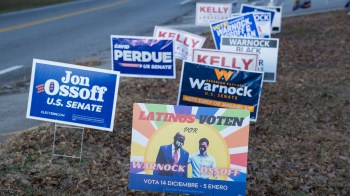All polluters not equal under new bill
TEXT OF STORY
Kai Ryssdal: After more than a couple of fits and starts — and a political hiccup or two — the long-awaited Senate climate bill was officially introduced today. It’s a biggie, a thousand pages that’ll touch almost all of the American economy. The hope is that it’ll overhaul U.S. energy policy and cut our greenhouse gas emissions at the same time. That’s no easy thing to do. So the bill does something interesting: Not all polluters are treated equally.
From Washington, Marketplace’s Nancy Marshall Genzer explains.
Nancy Marshall Genzer: The bill would impose new limits on carbon-dioxide pollution from utilities, factories and oil companies. But the political climate in the Senate is rough. So the bill’s sponsors — Democrat John Kerry and Independent Joe Lieberman — decided on a gradual phase-in.
Dan Esty teaches environmental law and policy at Yale.
DAN ESTY: They’ve decided that it makes sense to move to a hybrid approach that begins with a fast start in the utility sector and then rolls out more slowly across other industries.
The government would pass out free pollution credits to utilities starting in 2013. But they would eventually pay for them. If utilities cut their pollution and had credits left over, they could sell them on a regulated trading floor. Chemical, steel, cement and other manufacturers would get their free permits in 2016. And they could sell leftovers too.
Steve Cochran is with the Environmental Defense Fund. He says the market for pollution credits would be limited to permit holders. The idea is to keep out speculators just there to game the system.
STEVE COCHRAN: And so the idea that we’d be creating a big new trading system for the entire economy just didn’t seem to make sense.
Oil companies would not be allowed into this market. They would have to buy carbon credits for their refineries. If they didn’t use all of their credits, they couldn’t trade them. Cochran says that keeps the market small enough to regulate. And oil companies are on stronger financial footing than utilities and manufacturers, so can afford to pay for their permits from the start.
Scott Segal disagrees. He lobbies for utilities and oil companies.
SCOTT SEGAL: There is no industry in the United States that is more adversely affected by the legislation than the domestic refining industry.
Segal says oil companies would pass costs onto consumers. And he says gas prices would go up. There’s one thing Segal does like about the bill. He says it would be much easier to deal with one federal program than many state ones that currently exist.
In Washington, I’m Nancy Marshall Genzer for Marketplace.
There’s a lot happening in the world. Through it all, Marketplace is here for you.
You rely on Marketplace to break down the world’s events and tell you how it affects you in a fact-based, approachable way. We rely on your financial support to keep making that possible.
Your donation today powers the independent journalism that you rely on. For just $5/month, you can help sustain Marketplace so we can keep reporting on the things that matter to you.


















